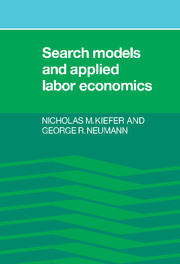Book contents
- Frontmatter
- Contents
- Preface
- 1 Introduction
- Part I Wages, reservation wages, and duration
- 2 Estimation of wage offer distributions and reservation wages
- 3 An empirical job-search model, with a test of the constant reservation-wage hypothesis
- 4 Individual effects in a nonlinear model: explicit treatment of heterogeneity in the empirical job-search model
- Part II Continuous-time models of duration
- Part III Applications
- Part IV Mobility and contracting
- Index
3 - An empirical job-search model, with a test of the constant reservation-wage hypothesis
Published online by Cambridge University Press: 06 October 2009
- Frontmatter
- Contents
- Preface
- 1 Introduction
- Part I Wages, reservation wages, and duration
- 2 Estimation of wage offer distributions and reservation wages
- 3 An empirical job-search model, with a test of the constant reservation-wage hypothesis
- 4 Individual effects in a nonlinear model: explicit treatment of heterogeneity in the empirical job-search model
- Part II Continuous-time models of duration
- Part III Applications
- Part IV Mobility and contracting
- Index
Summary
In the 17 years after Stigler's work on search theory, economists have relied increasingly on the notion of search activity to explain diverse economic phenomena. The explanation of one type of unemployment – search, or frictional unemployment – is sometimes considered to be the essential contribution of search theory, but this is a narrow view. The concept of productive investment in search has been used to explain such diverse phenomena as price rigidity (Gordon and Hynes 1970), advertising expenditure (Gould 1970; Butters 1974), duration of unemployment spells (Ehrenberg and Oaxaca 1976; Classen 1977), retention of military personnel (Gotz 1975), the effects of minimum wages (Mincer 1976), quits and layoffs (Mortensen 1977; Parsons 1973), and marriage and divorce rates (Becker, Landes, and Michael 1977). Despite the wide and growing list of empirical phenomena which have been “explained” by search theory, it seems a fair assessment of the subject would have to state that, apart from tightening some theoretical arguments on several topics, the concept has had little effect on the way economists interpret data and almost no effect on matters of public policy.
A major reason for this current situation is the lack of empirical work on search theory. Moreover, what empirical research has been done generally has been only minimally related to the underlying theory. In consequence, it has been difficult to interpret the empirical results, and, more important, it has been impossible to infer whether a given set of results is or is not consistent with a search-theoretic interpretation.
- Type
- Chapter
- Information
- Search Models and Applied Labor Economics , pp. 42 - 62Publisher: Cambridge University PressPrint publication year: 1989



